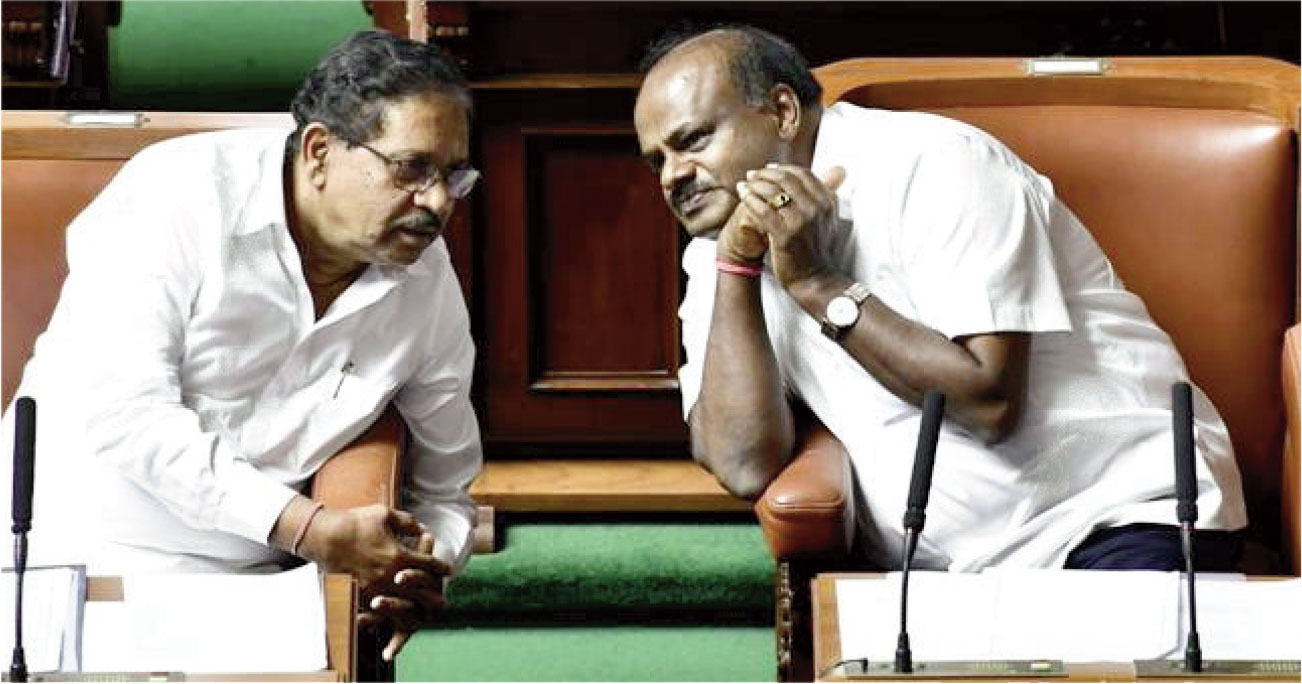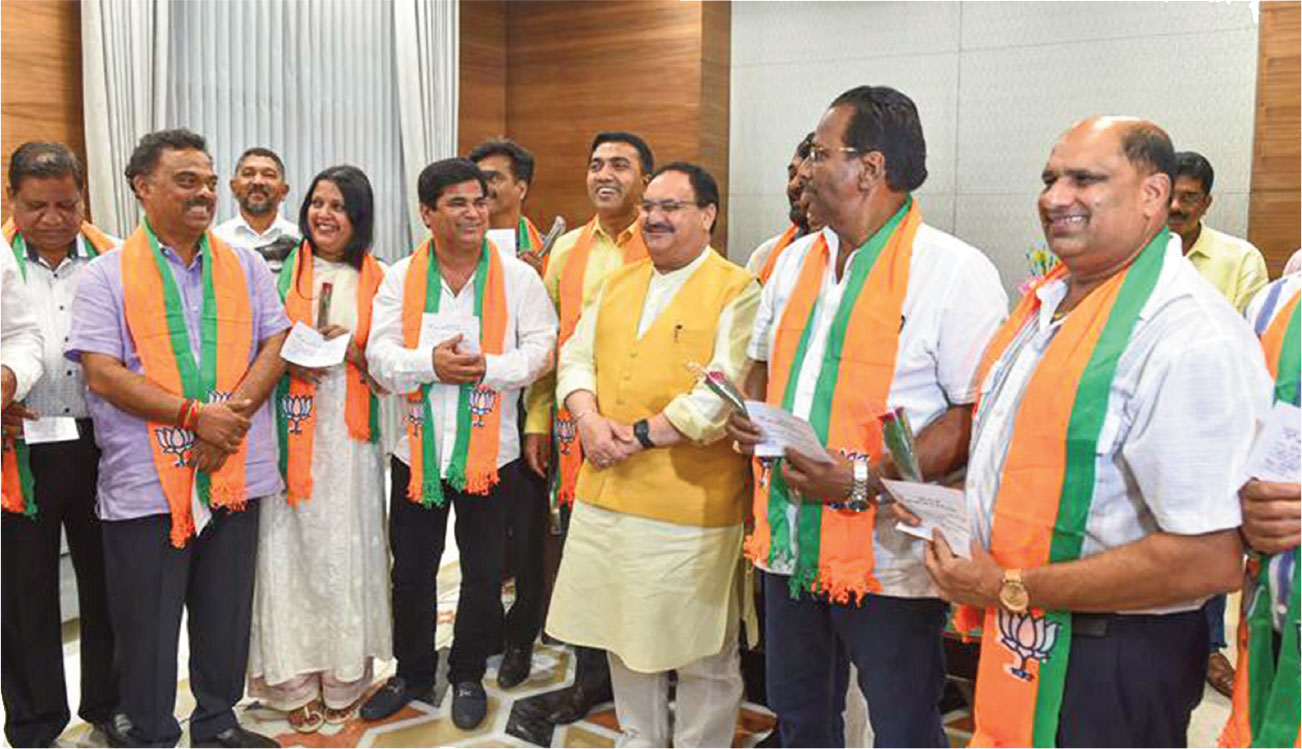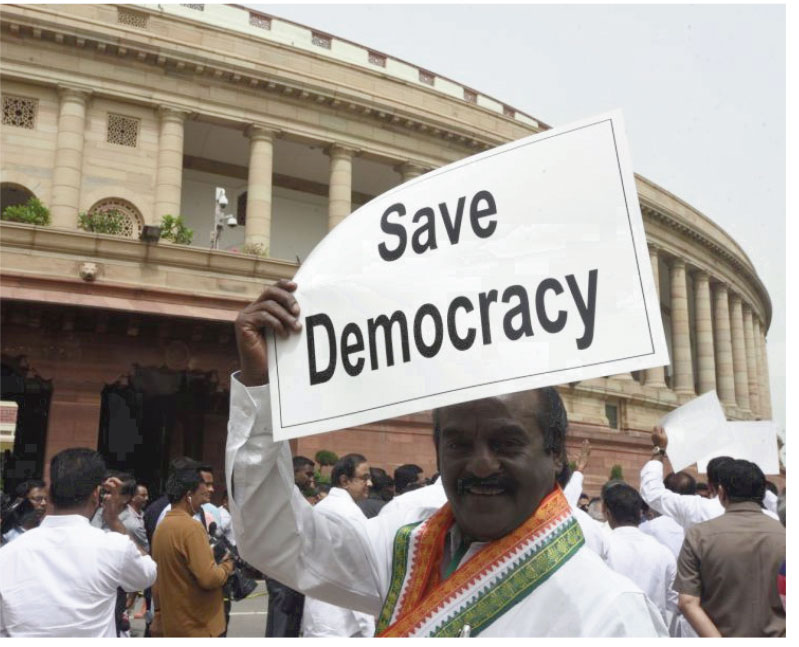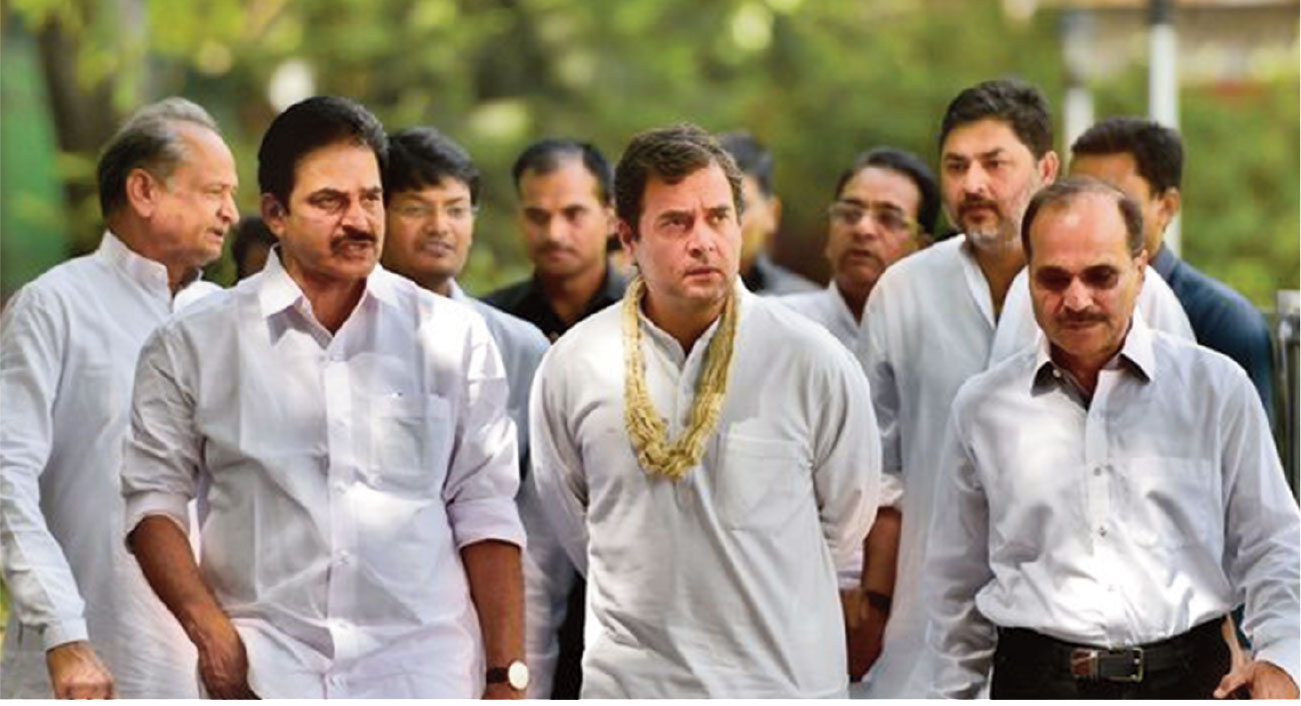Back to the politics of
Aya Ram Gaya Ram
Hari Jaisingh
 Chief Minister H D Kumaraswamy and Deputy Chief Minister G.
Chief Minister H D Kumaraswamy and Deputy Chief Minister G.
Parameshwara, during the monsoon session of Karnataka Legislative
Assembly in Bengaluru
Whither Indian
politics? The
question is not
one of
whether it is
going right or
left. For a complex developing
polity like ours, what matters is a
balanced march to keep the
nation going on in a desired
direction. Are we failing our
people at the grassroots on this
count? How come?
As it is, the Indian system has
got crystallized around two
seemingly opposite political,
ideological and opportunistic
pulls. On the one hand, the stress
has been on cooperation and
consensus. On the other hand, we
see the nation-building exercise
by the BJP regime towards a
Hindu-oriented integration in the
polity, apparently in view of the
country’s long history of political
fragmentation and disunity.
 J P Nadda with defectors from Goa.
This trend has unleashed
competitive politics between
fragmented opposition parties in
the States and at the Centre. The
plight of the Congress on its
leadership issue has made things
worse.
J P Nadda with defectors from Goa.
This trend has unleashed
competitive politics between
fragmented opposition parties in
the States and at the Centre. The
plight of the Congress on its
leadership issue has made things
worse.
Voices of dissent against the
ruling groups, rightly or wrongly,
give the impression that
Narendra Modi’s ruling
establishment is taking the
country towards one party
authoritarian rule. That is not
desirable for our democratic
polity which has not yet forgotten
Indira Gandhi’s Emergency
Chakra which was able to silence
the opposition leaders and voices
of dissent by those who governed
then in the name of the people.
What was then witnessed was
“irrational power of the formless
mass”, as Walter Lippman once
described it.
My intention here is not to
point an accusing finger at Prime
Minister Modi. He comes out as a
d e v e l o p m e n t - o r i e n t e d
democratic leader, especially
keeping his latest triple mantra of
Sabka saath, Sabka Vikaas and
Sabka Vishwas. Could this be
tall order? I keep my fingers
crossed.
 A Member of Parliament holding
A Member of Parliament holding
a placard 'Save Democracy'.
A complex polity like ours does
not live on mantras alone.
Otherwise, with the rich treasure
of our historical Vedas and their
lessons, we would have been on
the top of the world in all areas of
high thinking and intricacies of
statecraft. Take the Chanakya Niti.
It would have guided our rulers to
take the country to the Supreme
Position had they cared to read
and follow Chanakya’s creed and
ethos. No point in shedding tears.
I believe most of our powerpuffed leaders lacked national
vision and seem to get delinked
from the changing ground
realities.
My regret is that the political
parties today are mostly guided
by vote-and-note-bank politics.
When winning elections and
capturing power becomes the
sole objective of all political
activity, it is but natural to see the
play of money games and acts of
violence. Just look at the recent
disquieting events in Karnataka,
Goa and some other states. They
are caught in the politics of
defection and money greed in
today’s black money economies.
This may be difficult to prove. But
“hidden facts” speak a lot.
A seasoned Congress
leader ought to be made
of sterner stuff and be
committed to the basic
democratic values and
responsibilities. The
opposition scene right
now is appalling. The
trouble is that most
opposition leaders seem
to be self-centred and
wedded to personal
ambitions.
Let me recall the anti-defection law. The “Aaya Ram Gaya Ram”
phrase was coined in 1967 after
Haryana MLA Gaya Ram changed
parties thrice on the same day.
The thrust of the anti-defection
law was to prevent such political
defections which may be due to
reward of office or similar
considerations. The 10th
Schedule was inserted in the
Constitution in 1985 which spelt
out the process by which
legislators may be disqualified.
I am not going into the
question of when an MLA can be
disqualified. Such provisions are
well spelt out and are quite well
known in the corridors of power.
However, politics these days is
run by the “sab chalta hai”
mentality. In the circumstances,
who cares for ethics and
principles?
 Ten Congress members, led by leader of opposition Chandrakant Kavlekar, giving a letter for the merger of their faction with the BJP to
Speaker Rajesh Patnekar, in Panaji
Ten Congress members, led by leader of opposition Chandrakant Kavlekar, giving a letter for the merger of their faction with the BJP to
Speaker Rajesh Patnekar, in Panaji
 Rahul Gandhi with his party leaders
Rahul Gandhi with his party leaders
In fact, the record of Indian
politics has been one of mergers,
splits, electoral alliances and
defections. Of course, in the
Karnataka and Goa cases, one
could notice the “Aya Ram”
phenomenon towards the BJP’s
magnetic power which seems to
attract power-hungry Congress
and JD (S) legislators!
Well, the quality of Indian
democracy cannot be upgraded
as long as double standards,
hypocrisy and doublespeak rule
the political thinking and action.
In fact, slavish mentality cannot
help the democratic process to
grow on healthy lines.
Take the question of a national
alternative. The Congress is on
the decline, for the present,
simply because it has failed to
learn from its earlier mistakes. A
healthy opposition alternative has
to be based on clear-cut policies
and programmes, not on
negativism. Going the way Rahul
Gandhi has conducted himself in
national power politics before
and after the poll verdict, I see
him as an escapist from the
challenges before him. His
escapist attitude has created a
leadership crisis for the historical
party.
A seasoned Congress leader
ought to be made of sterner stuff
and be committed to the basic
democratic values and
responsibilities. No wonder, the
opposition scene right now is
appalling. The trouble is that most
opposition leaders seem to be
self-centred and wedded to
personal ambitions. Perhaps, this
is what makes Indian politics a
fascinating force, notwithstanding
the dominating presence of Prime
Minister Modi in the BJP-led NDA
regime.
I occasionally feel that Indian
society deserves a better deal.
But, at the same time, I realise
that a society gets the leaders it
deserves. I am not going into the
question of merits or demerits of
our leaders. But, I would like to
say that India’s “intellectuals”
hovering around the corridors of
power have also contributed to
confusing the people with regard
to their real problems and issues
for petty favours. Perhaps, they
are the victims of the prevailing
atmosphere in the country.
The moot question is:
how to revive the public
faith of the people in the
nation’s destiny, and not
get lost in the majorityminority syndrome? India
has a composite culture.
All its elements have to be
strengthened at the
grassroots.
It is a hard fact that values and ethics have declined. I do not
wish to blame any leader or party.
As for the people, their central
concern is the nation must move
forward towards a cleaner public
and political life. I passionately
believe that India must rediscover
itself, re-building its structure a
new on modern but value-based
foundations. Will our leaders,
irrespective of their political
colour, draw certain pertinent
lessons from Karnataka and Goa
developments in a wider rational
perspective?
It is necessary to build the
national character in every
segment of our society.
The moot question is: how to
revive the public faith of the
people in the nation’s destiny,
and not get lost in the majorityminority syndrome? India has a
composite culture. All its
elements have to be strengthened
at the grassroots.
Look at Indonesia. It is the
largest Muslim country in the
world. Yet its culture bears a
Hindu stamp which flourishes
unquestioned. Indians can also
learn from the philosophy of Sufi
saints. It is a pity that the people
of the Kashmir Valley seem to be
ignoring it. They must come out of
their mental barriers and be part
of the national mainstream while
retaining their traditional values!



